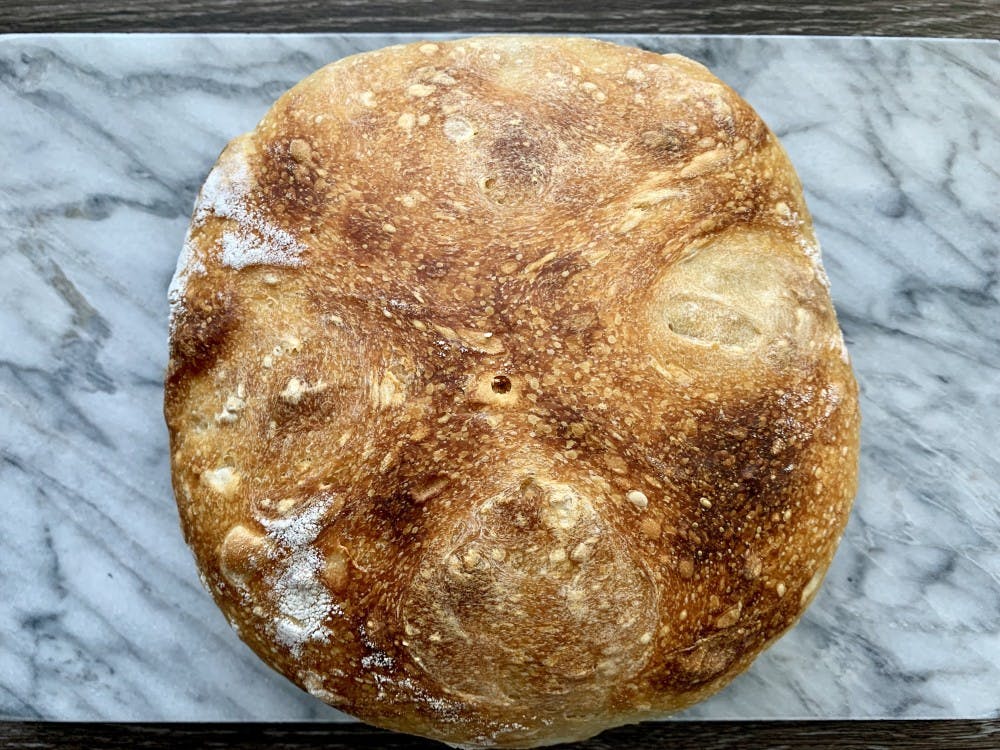If you don’t know anything about the artisanal bread-baking process, specifically sourdough, it’s just that — a process. The first time I attempted a loaf, if actually came out great. Since then? I’ve had quite a few slip-ups, let me tell you. The thing is, sourdough bread baking is as much a mental challenge as it is therapy, and I wouldn’t trade the experience for anything.
Sourdough is a creature of its own — reacting to air quality, water temperature, room temperature, ingredients and more. Honestly, by the end of the process, you really feel like you are caring for a baby of sorts. Between the starter and the bread itself, sourdough parenthood will reward the love and care you put in by way of your product, so have patience!
The starter is perhaps the defining factor of sourdough, as it is the yeast that ferments to allow the bread to rise. The starter also gives the sourdough its sour taste — the stronger your starter, the stronger the flavor. This component is made of flour and water, but sustained over months and years if cared for directly. I was actually able to create my own starter, but success with this is incredibly fickle — so if at first you don’t succeed, try again and again, or take the millennial route and order a starter from Amazon.
Activating your starter will depend on the route you take. If you decide to make your own, I would recommend the guide from the blog “The Clever Carrot” under the “sourdough” tab. Honestly, this was my most prized resource for the whole process. The author Emilie Raffa lays out the process in very simple terms. She also has a book — “Artisan Sourdough Made Simple” — with many other great recipes for bagels, multigrain sourdoughs, focaccia and sandwich loafs. If you order a starter, directions should be on the package. Be sure to name your starter too — my starter’s infamous name is Albert.
If you choose to create your starter, you should repeat the feeding process — which means continually combining flour and water — until you have a bubbly starter that doubles in size after four to six hours. This means your starter is active, and you are ready to start baking.
A good scale is also essential to the process. Most recipes will be in grams so even just having an inexpensive scale will do. When you weigh your ingredients, you’ll get accurate measurements which will pay off incredibly in the baking process. I use a Tendomi digital kitchen scale that I got for $10, and it works well.
Other ingredients vary from recipe to recipe, but the biggest component is always flour. I recommend King Arthur Unbleached Flour. However, I suspect other flours would work as well — just be sure it is not enriched or bleached.
The baking process itself is honestly the part I find to be the hardest but also the most rewarding. I follow Raffa’s recipe, which in short includes making the dough, letting it rise in the appropriate setting — typically a warm part of the kitchen, I recommend the top of your fridge or inside the oven while it’s turned off — proofing (final rise of shaped bread before baking), autolysing (the short rest after combining flour and water), shaping (shaping the dough) and scoring (carving on the top). After you have done this, the bread is ready to bake. I use a Dutch oven as it traps the moisture and allows for a perfect crust to form.
You can score the bread in all sorts of different patterns, and if your bread has risen well, the scoring will turn out beautifully. Don’t be discouraged if this doesn’t happen the first few times though. I have made about six different loaves and still have not gotten the scoring or rising down. Even if the shape looks odd, still eat the bread! The good thing about making bread is that it can taste good regardless of presentation.
Sappy as it sounds, I found sourdough baking at a time in my life when I needed it the most — it was something I could put effort into that was not school-related. Making sourdough has taught me a lot about patience and about investing time in something you love to do. For me, that something happens to be baking and cooking, but this message is one that transcends the kitchen. Hopefully the bread-making process will show you that great things come from hard work and doing what you love. If nothing else, you get to eat your own delicious loaf of bread.
P.S. — Let me know if you start baking, I would be so happy to talk to you about it!
Isabel Salken is a Food Columnist for The Cavalier Daily. She can be reached at life@cavalierdaily.com.







